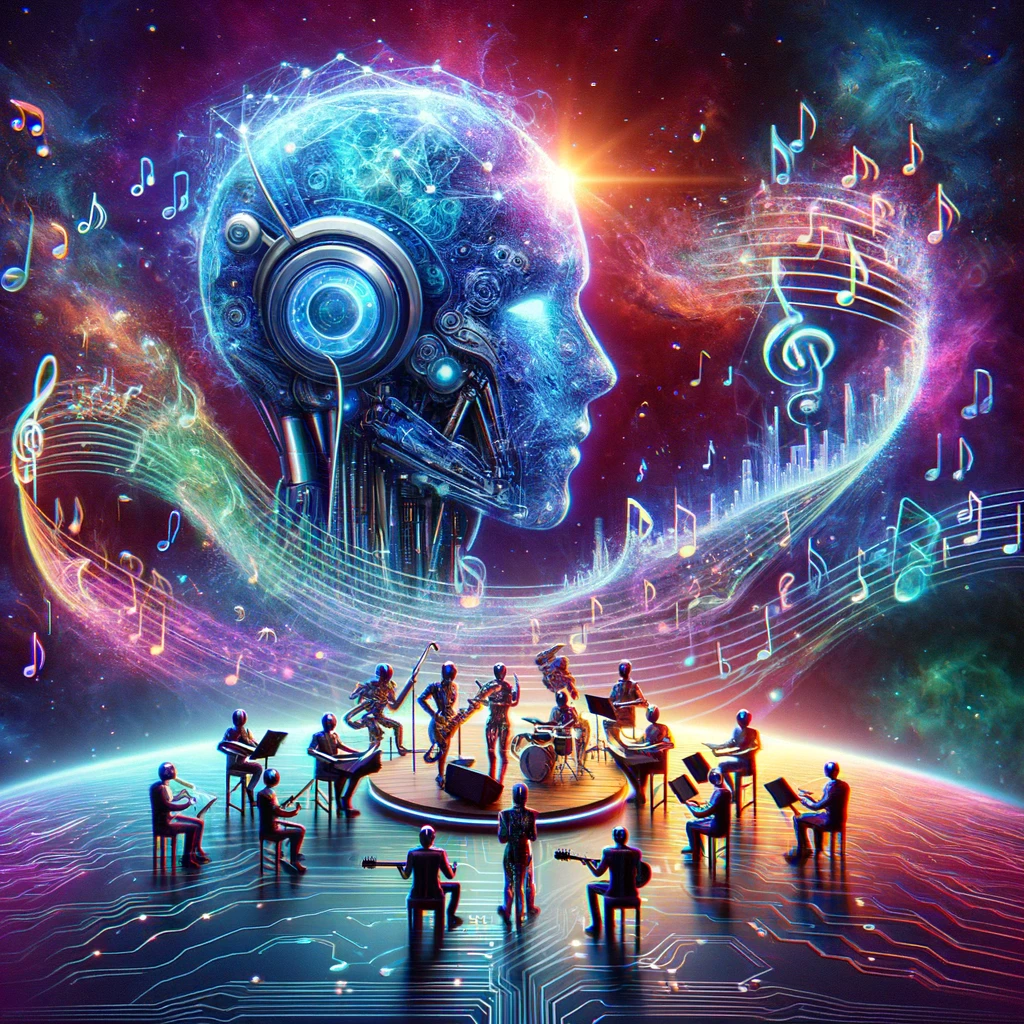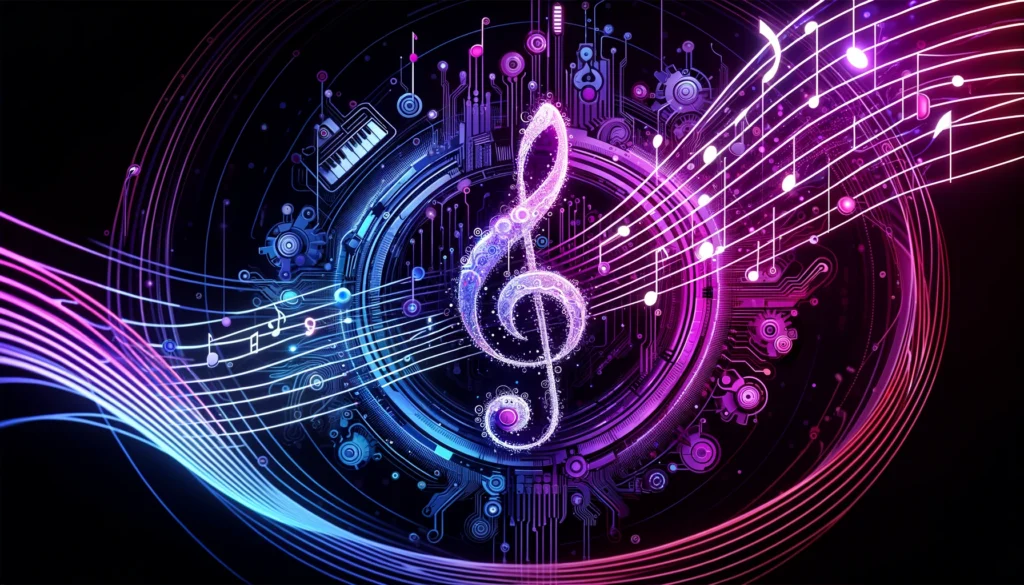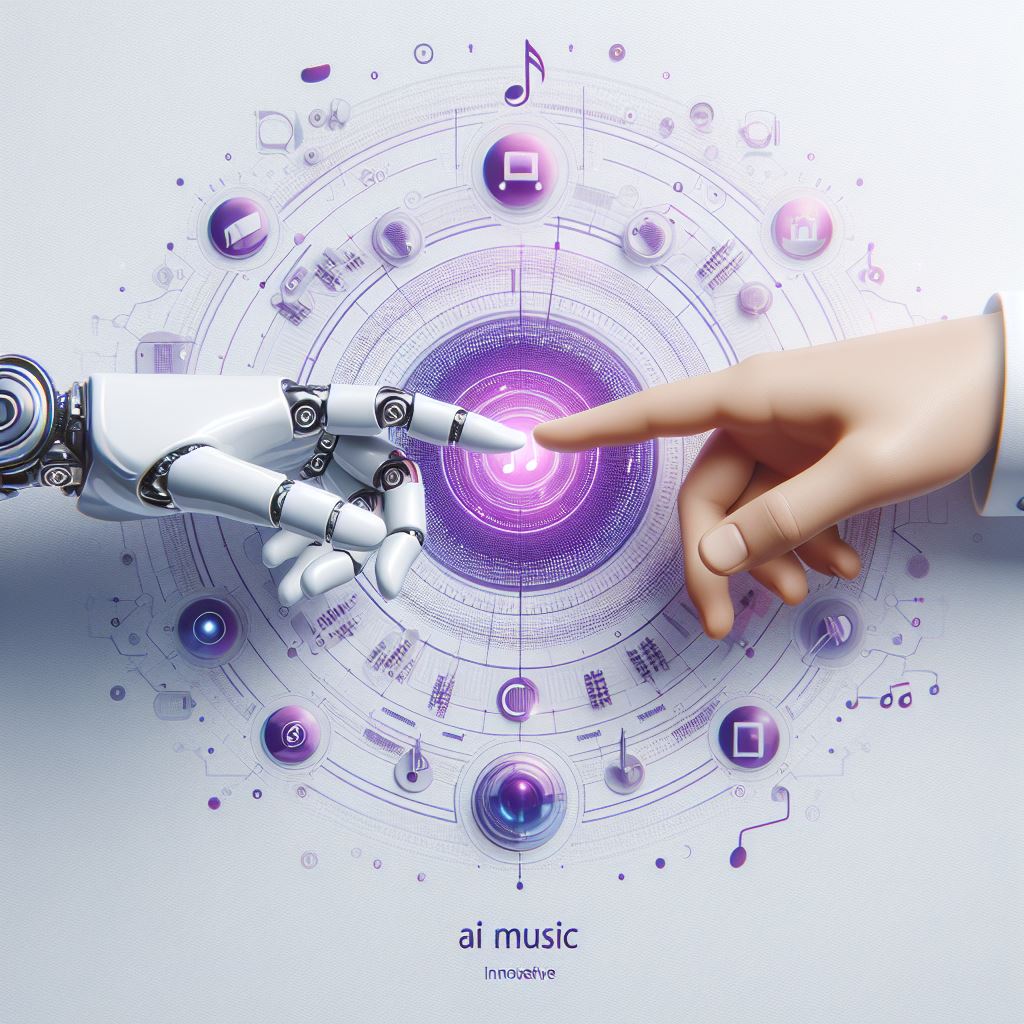The AI Music Revolution: How Artificial Intelligence is Transforming the Music Industry
The music industry stands on the brink of a transformative revolution, spearheaded by the advent and integration of artificial intelligence (AI). This seismic shift is not merely altering the way music is produced, distributed, and consumed but is also redefining the very essence of creative expression in the musical realm. As we delve into this revolution, it becomes imperative to understand the multifaceted impact of AI on the music industry, from composition and production to distribution and listener engagement.
AI in Music Composition and Production
The Emergence of AI Composers
AI’s role in music composition has evolved from a novel experiment to a serious tool in a musician’s arsenal. Algorithms now can analyze vast datasets of music, learning from genres, styles, and structures to create compositions that resonate with human emotions and preferences. These AI composers, such as IBM’s Watson Beat or Google’s Magenta, offer musicians and producers a collaborative partner in the creative process, suggesting chord progressions, melodies, and even complete compositions. This collaboration between human and machine opens up new horizons for creativity, enabling the exploration of musical expressions that were previously unattainable.
Production and Sound Design
In the realm of music production, AI technologies are revolutionizing sound design, mixing, and mastering processes. Tools like Landr use AI to master tracks automatically, providing musicians with a cost-effective alternative to professional studio services. Similarly, AI-driven software can now analyze and replicate the acoustics of different environments, allowing producers to experiment with sound textures and qualities without physical constraints. This democratization of music production tools lowers the barriers to entry for aspiring musicians and producers, fostering a more inclusive and diverse musical landscape.
Transforming Distribution and Consumption
Personalized Music Experiences
AI is reshaping how music is distributed and consumed, tailoring listening experiences to individual tastes and preferences. Streaming platforms like Spotify and Apple Music employ AI algorithms to curate personalized playlists, recommend new songs, and even predict future hits. This level of personalization enhances listener engagement, making music discovery an integral part of the daily lives of millions around the globe.
AI in Music Marketing and A&R
The application of AI extends beyond production and consumption into the realms of marketing and artist discovery. Record labels and music marketers are leveraging AI to analyze streaming data and social media trends to identify emerging artists and predict hits before they reach mainstream audiences. This data-driven approach enables more precise targeting of marketing efforts, optimizing the allocation of resources to artists with the highest potential for success.

The Ethical and Creative Implications
Copyright and Originality Concerns
As AI takes a more prominent role in music composition and production, questions arise regarding copyright and originality. The line between human creativity and machine-generated content becomes blurred, leading to legal and ethical dilemmas about ownership and copyright. The music industry must navigate these challenges carefully, establishing guidelines that protect artists’ rights while embracing the innovative potential of AI.
The Future of Human Creativity
Amidst the technological advancements, there is a growing discourse on the impact of AI on human creativity. While some fear that AI might supplant human artists, others view it as a tool that enhances human creativity, allowing artists to push the boundaries of traditional music composition and production. The future of music lies in a symbiotic relationship between human creativity and AI, where each complements the other, leading to the emergence of new musical genres and expressions.
The AI music revolution is transforming the music industry in profound ways, from the way music is created and produced to how it is distributed and experienced by listeners. As AI continues to evolve, its integration into the music industry promises to unlock unprecedented levels of creativity and innovation. However, this journey is accompanied by ethical considerations and challenges that require thoughtful navigation. Embracing AI in music not only necessitates technological adaptation but also a redefinition of creativity, copyright, and collaboration. The music industry’s future will undoubtedly be marked by the harmonious blend of human ingenuity and artificial intelligence, heralding a new era of musical expression and engagement.
The integration of artificial intelligence in the music industry is not limited to production and distribution; it extends into live performances, audience engagement, and education, further broadening the scope of this technological revolution.
AI’s Role in Live Performances and Virtual Concerts
Enhancing Live Music Experiences
AI technology is increasingly used to enhance live music experiences, offering both artists and audiences new ways to connect and interact. Through AI-driven visual effects and interactive light shows, concerts are transformed into immersive experiences. Furthermore, AI can analyze audience data in real time to adjust the performance or atmosphere to better suit the crowd’s mood, creating a dynamic and responsive concert experience.
Virtual Concerts and Performances
The rise of virtual concerts, especially in the wake of global events like the COVID-19 pandemic, has been facilitated by AI technologies. Virtual reality (VR) concerts, where artists perform in digital venues, have allowed fans to experience live music from the comfort of their homes. AI enhances these virtual experiences by creating realistic avatars of performers and adapting the performance in real-time based on viewer interactions. This blend of AI and VR technologies is expanding the boundaries of how and where live music can be enjoyed, offering potential for global reach beyond traditional concert venues.
Transforming Audience Engagement
Interactive Music Experiences
AI is transforming audience engagement by creating more interactive music experiences. Through AI-powered apps and platforms, fans can now interact with music in novel ways, such as altering the tempo, instrumentation, or even the style of songs in real-time. This not only personalizes the listening experience but also deepens the listener’s connection to the music by involving them in the creative process.
AI-Driven Music Education
The educational aspect of music is also undergoing a transformation through AI. With personalized learning platforms powered by AI, students can receive customized lessons that adapt to their individual learning pace and style. These platforms can analyze a student’s performance, providing feedback and recommendations to improve skills efficiently. AI in music education democratizes learning, making it more accessible and tailored to individual needs, thereby fostering a new generation of musicians.

The Business of Music in the AI Era
Monetization and Revenue Streams
AI is opening new avenues for monetization and revenue streams in the music industry. For instance, AI-generated music for video games, movies, and commercials can provide royalty opportunities for creators. Additionally, AI-driven analytics tools help artists and labels understand their audience better, enabling targeted marketing strategies that can lead to increased sales and streaming numbers.
Challenges and Opportunities in Copyright and Licensing
The integration of AI in music raises important questions about copyright and licensing. As AI-generated compositions become more common, the industry must address issues related to copyright ownership. Who owns the rights to a piece of music when it’s composed by AI? This question challenges existing copyright laws and requires innovative solutions to ensure fair compensation for all involved, including programmers, musicians, and AI developers.
The AI music revolution is reshaping the music industry in unprecedented ways, touching every aspect from creation to consumption. As AI technologies continue to evolve, they offer the promise of further innovations in live performances, audience engagement, and music education. However, these advancements also bring forth challenges, particularly in the realms of copyright and ethics, that must be thoughtfully addressed. The future of the music industry lies in a balanced coexistence between technology and creativity, where AI serves as a tool to enhance human expression rather than replace it. As we move forward, the potential for AI to redefine the music landscape is limitless, promising a future where music is more accessible, interactive, and inclusive than ever before.
In the evolving narrative of the AI music revolution, the spotlight increasingly falls on the broader implications for society, the sustainability of cultural diversity, and the ethical considerations that accompany the widespread adoption of AI in music. As we further explore this transformative journey, it becomes essential to reflect on how these technologies are shaping not just the music industry but also the cultural fabric of our global society.
The Societal Impact of AI in Music
Cultural Preservation and Innovation
AI has the potential to both preserve and innovate cultural musical heritage. By analyzing and learning from traditional music forms, AI can create compositions that pay homage to cultural roots while infusing them with contemporary elements. This duality of preservation and innovation offers a unique opportunity to revitalize endangered musical traditions and introduce them to new audiences. However, it also raises questions about cultural appropriation and the authenticity of AI-generated music that draws heavily from specific cultural heritages.
Accessibility and Inclusion
The democratization of music production and consumption through AI technologies has significant implications for accessibility and inclusion. AI-powered tools lower the barriers to music creation, enabling individuals from diverse backgrounds to express themselves musically without the need for expensive equipment or formal training. This inclusivity fosters a more diverse musical landscape, enriched by voices that were previously marginalized or unheard.
Ethical Considerations and Future Directions
AI and Creative Ownership
As AI becomes more deeply integrated into the creative process, the question of ownership and authorship becomes increasingly complex. The collaborative nature of AI-generated music challenges traditional notions of creativity, prompting a reevaluation of how we attribute credit and distribute royalties. Ensuring fair compensation for both human and AI contributors requires a nuanced understanding of copyright law and a willingness to adapt legal frameworks to new technological realities.
Balancing Innovation with Human Touch
The future of AI in music hinges on finding the right balance between technological innovation and the irreplaceable qualities of human creativity. While AI can generate music that mimics human emotion and complexity, there remains an intangible essence to human-created art that is difficult to replicate. The challenge lies in leveraging AI to enhance and augment human creativity, rather than attempting to replace it, ensuring that music remains a deeply human expression.
Looking Ahead: The Harmonious Fusion of AI and Music
The Role of AI in Shaping Future Musical Trends
As AI technologies advance, their role in predicting and even shaping future musical trends will become more pronounced. By analyzing vast amounts of data, AI can identify emerging patterns and preferences, potentially guiding artists and producers towards the next big sound or genre. However, this predictive power must be wielded with care to avoid homogenization and to ensure that innovation does not come at the expense of diversity.
Embracing Ethical AI Development
The ethical development and deployment of AI in music are paramount. This involves transparency in how AI algorithms are designed and used, as well as consideration for the privacy and rights of individuals. By fostering an ethical AI culture, the music industry can harness the benefits of these technologies while mitigating potential harms.
The Enduring Legacy of AI in Music
The AI music revolution is not a fleeting trend but a fundamental shift in how music is created, shared, and experienced. As we stand at this crossroads, the decisions made by artists, producers, and policymakers will shape the legacy of AI in music. By embracing innovation with a mindful approach to ethics and inclusion, the industry can ensure that this revolution enriches the musical landscape for generations to come.
The AI music revolution offers a vision of the future where technology and creativity converge in unprecedented ways, promising a world of musical innovation that is more inclusive, diverse, and accessible. As the industry navigates the challenges and opportunities presented by AI, the focus must remain on enhancing human creativity, preserving cultural diversity, and ensuring ethical practices. In doing so, the music industry can embrace the full potential of AI, forging a future that resonates with the richness of human expression and the boundless possibilities of technological advancement.

